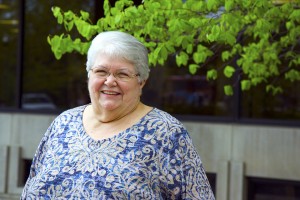Divide and conquer
Author: Lona

Author: Lona

 On the first day of Math 10, Chris Schultz asks her students one question: what are you good at?
On the first day of Math 10, Chris Schultz asks her students one question: what are you good at?
“They’re usually good at a lot of things,” Schultz said, a senior lecturer in Mathematics at Iowa State University.
But one answer never comes up: math.
“In Math 10, we have bright students,” she said. “But they hate math. Because it hasn’t been good to them. So, I say, ‘Connor, you said you were good at soccer? How did you get good at that? You practiced how many times a day? You suppose if you have a halfway decent coach and if you practiced you might get better at math?’”
What Schultz is good at is teaching. And she’s been practicing for decades.
Before joining Iowa State, Schultz taught K-12 public school for 35 years, with a background in gifted and talented education. Math 10 was the perfect fit for an educator who wasn’t quite ready to retire, and now she is changing student attitudes toward math, one polynomial at a time.
Math 10 helps students learn prerequisite material needed for specific entry level mathematics courses at Iowa State. Students have to be invested, though: they pay an extra fee and receive no credit for the class.
“Math 10 is an opportunity,” Schultz said. “Otherwise, these students will go into required math classes and I would be surprised if they pass. So then they are another semester with a failure and that continues to develop this ‘I can’t do math. I hate math,’ attitude.”
Schultz uses her gifted education background to identify student strengths and learning styles. The first week of class each student fills out a sheet about their high school math history. Then, like a detective with a stack of case files, Schultz examines them one by one.
“My background in gifted education tells me this student was very good at math at one time,” she said, pointing to one sheet. “Because he took algebra as an eighth grader. But then he retook it in high school. Something happened there. If bright kids don’t understand it, they hit a wall. If no one helps them around that wall, they get by, but then they hate it.”
About 50% of her students did not take math their senior year of high school, she said. That, combined with inconsistent definitions of calculus around the United States and a lack of long-term understanding, makes it difficult for some students to succeed in college math without a refresher course.
Developmental math isn’t new to universities. But Schultz does approach it in a new way for this generation of students.
“I use online homework,” she said. “They put in their answer and immediately know if they are incorrect. I ask them, ‘How many of you have turned in homework and three days later you got it back and found out you were wrong?’”
Now they know immediately. That, plus the personal touch Schultz brings to teaching, helps build confidence for students like Gillian Staten, a freshman elementary education major from Ankeny, Iowa.
“Math is confusing and challenging,” Staten said. “Going into this class, I hoped I would get help and I really have. I have a good solid B in the class. Now I understand it, and now I feel confident about it.”
Math 10 students range from elementary education to English to engineering majors, and Schultz understands her no-credit class isn’t always their first priority. She tries to lighten it up with the occasional corny math joke or grandmotherly advice.
“I ‘Mama Schultz’ them a lot,” she said, laughing.
But her passion for teaching is no joke.
“When people ask what I love to teach, my first response is ‘the students.’ Because what I teach are students and my subject area is math.”
Now that’s an equation for success.